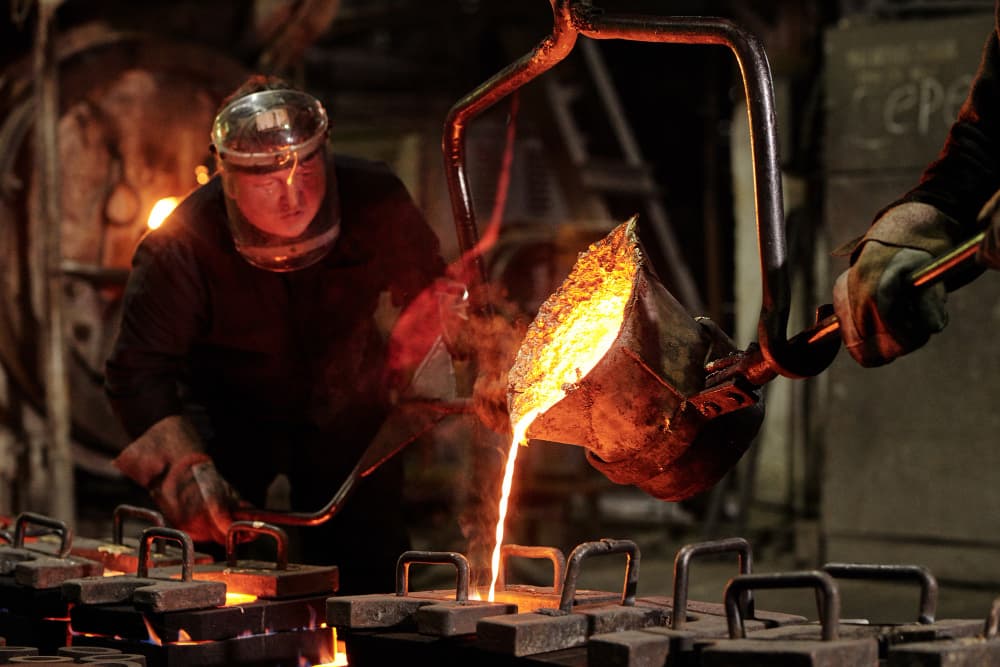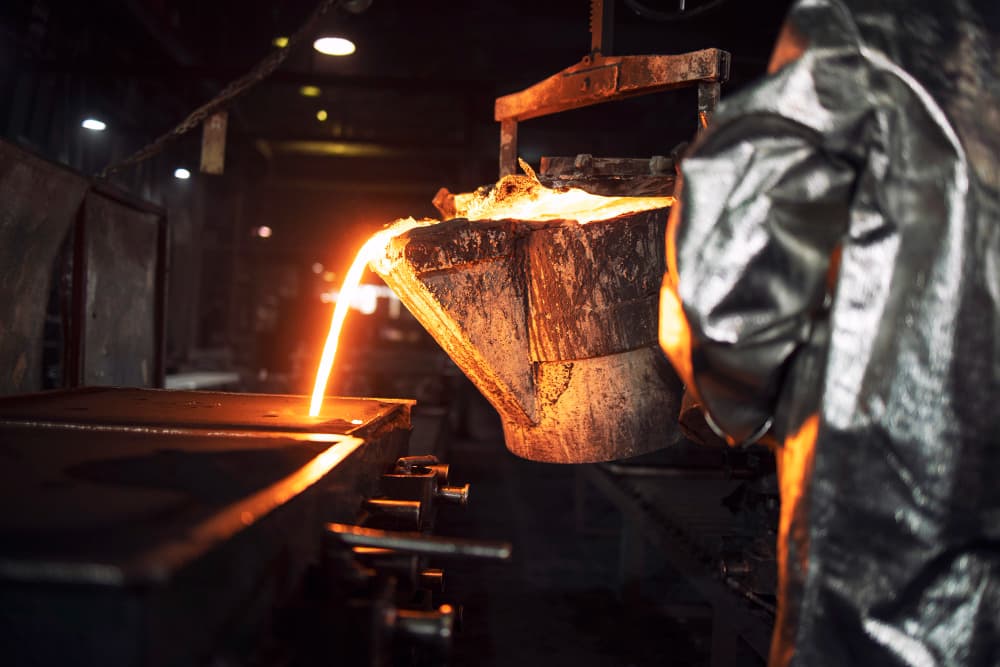
Welcome to Cast Technologies, your premier partner for aviation and aerospace castings in Illinois. Specializing in aircraft and aerospace aluminum casting, we deliver precision-engineered components that meet the rigorous standards of today’s industry. Our commitment to excellence ensures reliability, safety, and innovation in every casting we produce. Leveraging state-of-the-art technology and a skilled workforce, we cater to both commercial and defense sectors, ensuring that each project benefits from our expertise. Explore our comprehensive services tailored to elevate the performance of your aerospace applications, underscoring our dedication to quality and precision in every detail.
The aerospace industry relies heavily on precision casting to create high-quality components that ensure aircraft safety and performance. Castings, especially those made from alloys and metals, are essential for producing aircraft parts that withstand extreme conditions. As a Metal Foundry Worker, I’m deeply involved in crafting these intricate components using advanced metal casting processes. This involves both traditional and innovative techniques to deliver durable and reliable aerospace castings. The following sections examine the benefits of deploying castings for aircraft parts and highlight current innovations in aerospace metal casting that continue to drive the industry forward.
Using castings in aircraft parts offers numerous advantages that are crucial for the aerospace industry. Castings allow for complex shapes and intricate designs that might be impossible or prohibitively expensive to achieve through other manufacturing methods. This flexibility enables engineers to optimize the aerodynamics and performance of aircraft components.

Another benefit is the ability to utilize a wide range of alloys in the casting process. Different metal alloys provide specific properties such as strength, lightweight characteristics, and resistance to corrosion, which are vital in aerospace applications. The most commonly used alloys in aerospace castings include aluminum and steel, each offering unique advantages. Aluminum castings, for example, are lightweight, which contributes to fuel efficiency. Meanwhile, steel castings are known for their durability and strength, supporting critical structural functions. Precision investment casting ensures these components meet the stringent standards required for aircraft safety. By leveraging the precise nature of these methods, the aerospace industry can produce parts with minimal waste and high repeatability, ensuring cost-effectiveness and reliability.
Innovations in aerospace metal casting continue to reshape the landscape, enhancing the industry’s ability to meet growing demands. New technologies, such as 3D printing combined with traditional casting techniques, are leading to more efficient production processes. These advancements allow metal foundry workers to prototype aircraft components quickly and test new designs with reduced lead times. The use of computer-aided design (CAD) has further innovated the casting process by enabling more precise and customizable patterns. In addition, the adoption of advanced materials and alloy formulations enhances performance by offering improved resistance to extreme environmental conditions encountered during flight. Another key innovation is the development of smarter casting techniques, which includes the integration of machine learning and AI to predict and rectify defects during the casting process. This ensures higher quality and consistency in aerospace castings. At Cast Technologies, we’re committed to staying at the forefront of these innovations, constantly seeking ways to combine traditional craftsmanship with cutting-edge technology to produce the best possible components for the aerospace industry. These innovations highlight a promising future where casting technologies will continue to evolve, driving efficiency and performance improvements in aerospace manufacturing.
When it comes to selecting a supplier for aerospace and aviation castings in Illinois, understanding the intricacies involved is essential. A reliable supplier should provide high-quality technical castings that meet the demanding standards of the aerospace industry. In Rockford, Illinois, and the greater Chicago area, there are numerous manufacturers and alloy foundries capable of delivering excellence in investment castings. It’s important to weigh key factors such as expertise, technology, and industry experience when making a decision. The following sections will delve into the crucial considerations that can help industries in choosing the ideal technical castings supplier.
Choosing the right supplier for technical castings in Illinois involves a thorough consideration of several key factors. Firstly, the supplier’s expertise in handling various alloys is crucial, as different aerospace applications require specific metal properties. In cities like Rockford and Chicago, numerous alloy foundries are available, but not all have the experience to meet the sophisticated needs of the aerospace sector. It’s vital to select a supplier that can manage the intricacies of investment castings effectively, ensuring each piece meets industry specifications. Moreover, the technology employed by the supplier is another critical aspect. Advanced casting processes can significantly impact the final product’s precision and quality. Thus, it’s important to choose a manufacturer that integrates modern techniques, such as computer-aided design and 3D printing, to streamline production and enhance the structural integrity of the cast products. Lastly, consider the supplier’s track record and reputation within the industry. A reliable supplier will have a history of successful partnerships and delivered quality products. Evaluating client testimonials, project case studies, and any accreditation or industry certifications can provide a clearer picture of a supplier’s capability to deliver high-quality technical castings. By addressing these key factors, industries can ensure they partner with a supplier that not only meets their technical requirements but also contributes positively to the aerospace manufacturing landscape.

Creating high-quality components for the aerospace industry involves a detailed casting process, especially with materials like aluminum and steel. The choice of material significantly impacts the outcome, affecting both weight and structural integrity. In aircraft manufacturing, aluminum castings offer the advantage of lightweight properties, while steel castings provide exceptional strength and durability. This balance is crucial for ensuring safety and efficiency in aviation applications. By examining the processes involved in casting these materials, we can understand their role in producing reliable aircraft parts that meet stringent industry standards.
When it comes to casting applications for aircraft, the decision to use aluminum or steel castings hinges on several critical factors. Aluminum castings are particularly valued for their lightweight attributes, which directly contribute to fuel efficiency, a paramount consideration in the aerospace industry. The process of casting aluminum involves melting the alloy and pouring it into molds, creating intricate shapes that cater to specific aerodynamic requirements. This flexibility allows designers to optimize the performance of aircraft components without compromising on strength. On the other hand, steel castings excel in scenarios where robustness and structural integrity are prioritized. Steel’s natural toughness offers superior support for critical aircraft parts subject to high stress and extreme operational conditions. The casting process for steel is similar to that of aluminum, yet it requires higher temperatures due to steel’s melting point. This nuances the manufacturing process, demanding advanced techniques and precise control to achieve the desired quality and consistency. The choice between aluminum and steel in casting ultimately depends on the intended application, specific performance needs, and balancing the trade-off between weight and strength. By understanding these differences, manufacturers can make informed decisions that lead to the efficient production of aircraft parts, ensuring they meet the rigorous demands of aerospace operations.
The aerospace sector is undergoing a significant transformation driven by advances in casting technologies. With innovation at the core, both established and emerging trends are reshaping manufacturing, bearing promise for future aerospace developments. The integration of new alloy designs and casting processes like investment casting is enhancing efficiency and performance across industries. These innovations are pivotal for the future of the aerospace industry, paving the way for more robust, lightweight, and cost-effective solutions. Let’s delve into the emerging trends that are crafting a new era in aerospace manufacturing.
Emerging trends in aerospace manufacturing are preparing the industry for an exciting future where the use of cutting-edge casting technologies is increasingly prominent. A notable trend is the shift towards using advanced alloys that can withstand extreme environmental conditions, setting new standards for performance and safety. These alloys, combined with innovations in the investment casting process, allow for the production of complex components at a fraction of the time and cost traditionally required. Technologies like 3D printing are also at the forefront, enabling rapid prototyping and facilitating the testing of aerodynamic designs. As these processes become more integrated, they enhance the capability of industries to produce highly tailored aerospace components. Additionally, the embrace of automation and smart manufacturing systems is streamlining efficiency across the sector. Machine learning, for instance, is being employed to predict defects and optimize the casting process in real-time, ensuring the highest quality outcomes. As a Metal Foundry Worker at Cast Technologies, I see firsthand how alloy advancements and technological integration make a substantial impact. These developments align with the broader industry push towards sustainable manufacturing practices, reducing waste while maintaining the rigorous standards required in aerospace manufacturing. Ultimately, these emerging trends are not merely reshaping the sector; they’re setting the foundation for an innovative future where aerospace advancements rise to unprecedented heights.
Partnering with Cast Technologies for your aviation and aerospace casting needs in Illinois means choosing a supplier renowned for precision and innovation. Our expertise in aircraft and aerospace aluminum castings ensures you receive components that meet rigorous industry standards and deliver reliable performance. Committed to quality, we leverage cutting-edge technology and skilled craftsmanship to achieve outstanding results. Trust us to support your projects with unparalleled service, helping you soar to new heights. Contact us today to discuss how we can contribute to your success in the dynamic world of aviation and aerospace.

Top quality casting and services via our in-house foundry & machine shop
1100 SW Washington St Peoria, IL 61602 USA
© 2023 Cast Technologies. All Rights Reserved.
